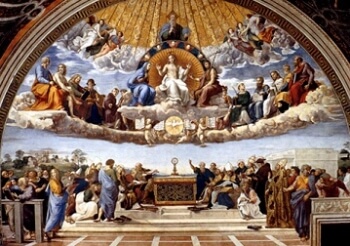 If my wife came to me and said she was sick and was soon expecting to endure a painful death, the first words out of my mouth upon learning this would not be, “Do you mind if I use your life insurance money to run for mayor?” While not a perfect comparison, it’s one that came to mind as I reflected on today’s Gospel selection from Mark. Jesus informs his disciples (for the third time, in Mark) that he would soon be humiliated, scourged, and killed, but rise from death after three days. That’s a pretty heady thing to say to those closest to you. So how do James and John react? By requesting to the Lord: “Grant that in your glory we may sit one at your right and the other at your left.”
If my wife came to me and said she was sick and was soon expecting to endure a painful death, the first words out of my mouth upon learning this would not be, “Do you mind if I use your life insurance money to run for mayor?” While not a perfect comparison, it’s one that came to mind as I reflected on today’s Gospel selection from Mark. Jesus informs his disciples (for the third time, in Mark) that he would soon be humiliated, scourged, and killed, but rise from death after three days. That’s a pretty heady thing to say to those closest to you. So how do James and John react? By requesting to the Lord: “Grant that in your glory we may sit one at your right and the other at your left.”
In other words (as I paraphrase it mentally), “Yes, Jesus, we hear that you’re going to die soon; is it okay that we get places of exalted authority when you go?” This is not the sentiment that I would expect from those closest to me if I told them world-changing news.
Jesus’ reaction is not as incredulous or caustic as my response would have been (proving again how much further I have to go in my life of Christ). He tells them in no uncertain terms that they don’t know what they’re asking, but – even though they’re going to suffer as Christ would suffer – those positions of power are not Christ’s to give.
Prayers to God are also the subject of today’s Old Testament and Psalm readings. In both, the petitioner is requesting that the Lord grant their hearts’ desires. In the case of the reading from Sirach, some of those requests feel a bit distant from what I typically associate with things I personally ask God:
- Give new signs and work new wonders.
- Gather all the tribes of Jacob, that they may inherit the land as of old.
- Reward those who have hoped in you.
The prayers from the Psalm 79 are more in line with my own prayers to the Lord:
- Remember not against us the iniquities of the past.
- Deliver us and pardon our sins.
- With your great power free those doomed to death.
One metaphor I use when thinking about spiritual matters is the question, “Are there mashed potatoes in heaven?” It’s a question I use to point out the absurdity of certain lines of thought. If I could have any insight into the exact nature of the hereafter, why in the world would my first question be, “Will there be mashed potatoes?”
This ludicrous question came to mind when I reflected on the nature of prayers and petitions to the Lord. If I could make a request of the Lord, why would I pray for land, or signs, or rewards? Before the revelations of Christ, people did not have as great an understanding of spiritual matters, and the notion of asking the Lord for proof and rewards seemed like the best you could hope for from the Creator of the Universe. “This physical world is all I understand, so a smart prayer is one that makes things better in this physical world.”
How blessed I feel to know the love, power, and teachings of Jesus! He reminded us that everything we know physically is a blink in the eternal eye: The aches and pains of mortal flesh. The goals and ambitions of the mortal world. The worries and doubts of the mortal tomorrow. All of them insignificant, in the grand scheme of things.
Do we use our petitions to Jesus to request positions of power for ourself? For rewards? For wonders and signs? Or do we ask for forgiveness? For redemption from our sins? For salvation from eternal death? As the maxim says, God answers all prayers, even if sometimes the answer is “no.” Jesus denied a direct petition, because the question as they understood it did not hold meaning: “Whoever wishes to be great among you will be your servant; whoever wishes to be first among you will be the slave of all.”
We may want to make sure our own prayers and petitions are similarly thoughtful, so that the Lord may give us a thoughtful answer. Otherwise, we might just be asking what’s on the menu in heaven.
